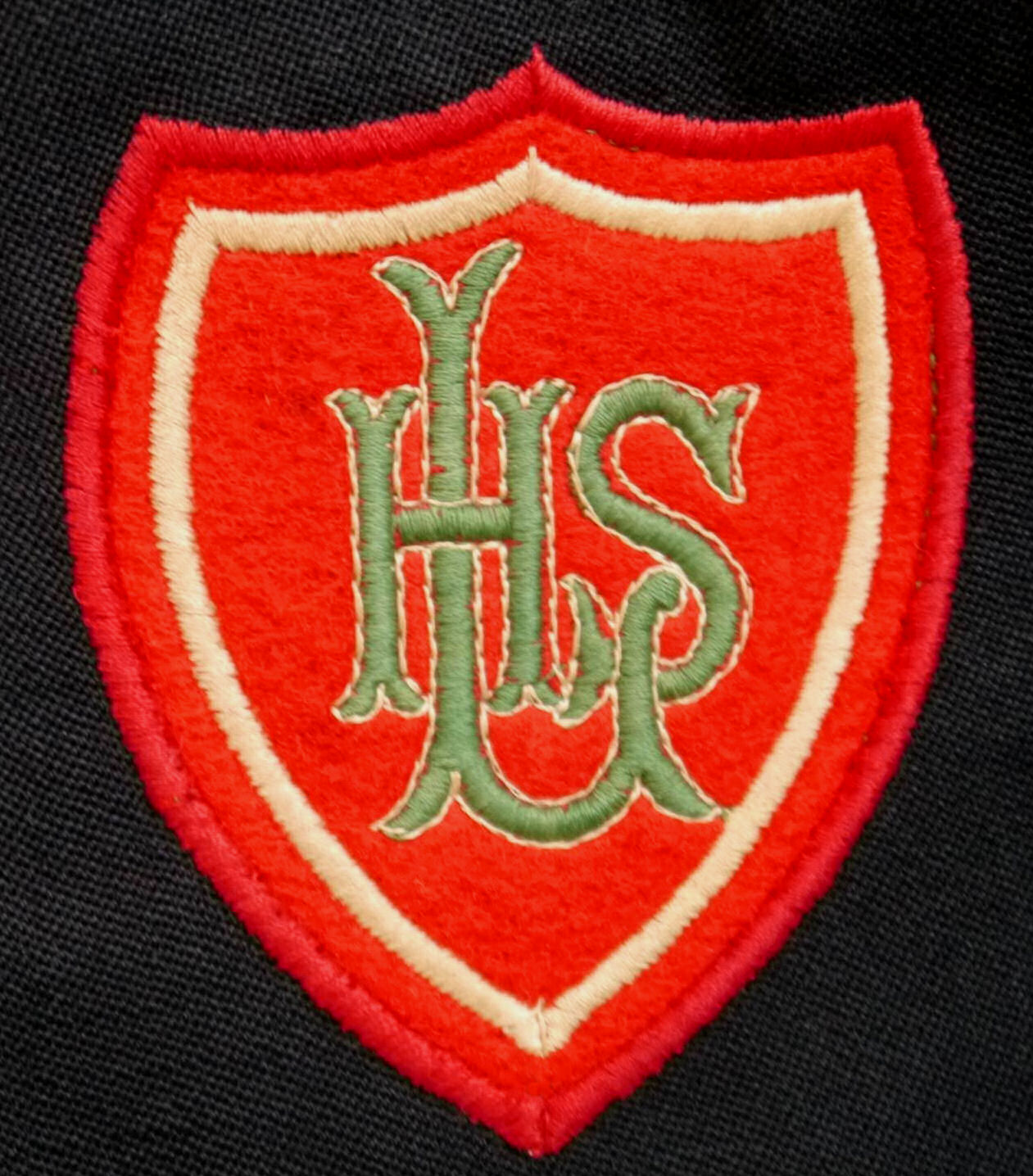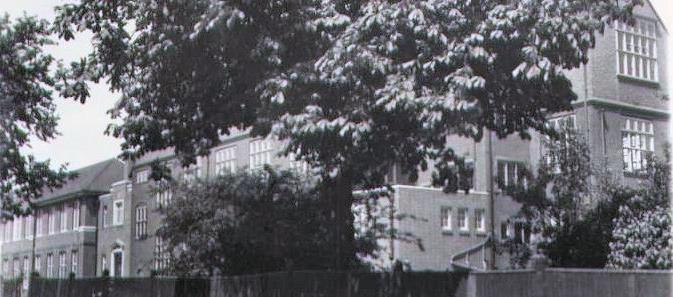
Loughton County High School for Girls




Copyright © 2013 by Susan Capes · All Rights reserved · E-Mail: sue@loughtonchs.co.uk
The Birth of the Crofton Singers
The Croftons first met as such in the autumn of 1947, but their origins go back two years earlier to the formation of the Combined Choir of Loughton High School for Girls and Bancroft’s School (for boys) in the autumn of 1945, the heady year in which the war ended. This was the brainchild of Don Francombe the classics master who was also in charge of music at Bancroft’s and Florence James (always known as Flo, though not to her face!), the music mistress at Loughton. It really was a most unlikely alliance between two very different people working at two schools with quite different musical traditions. Don was a gentle man with a very strong imaginative vision. He wasn’t a professionally qualified musician though he played the organ tolerably well for school chapel services (for those of us who were boarders) and his teaching of music in the school was confined to the rudiments of music and singing with first year classes. I think what really influenced us boys was his taste in music, literature and drama - he ran the Bancroft’s Players with splendid productions each year. Flo, on the other hand, was a professionally accomplished music teacher, choir director and pianist and expertly taught a full music curriculum at Loughton.
I don’t know which of the two first had the idea of the collaboration, but it was certainly in the best musical interests of the 6th formers in both schools in that it opened up for them the great music of the choral repertoire that neither the Loughton girls could enjoy without male voices, nor the senior Bancroft’s boys without a choir school to coach young trebles. What is perhaps surprising is that we started off with a work, Brahms’ Requiem, suggesting a quite different direction from what they (and the Croftons) were later to take. The Requiem was duly performed in St. Mary’s Loughton in the spring of 1946 with accompaniment on the organ very capably played by an Old Bancroftian John Hunt. Why did they choose it? Well, of course it is a great piece with rewarding choral writing: but perhaps the real reason was that Denis Quilley was available. He had only just left Bancroft’s and was later to achieve fame as an actor: but he had a lovely baritone voice even at that age, and sang the two big solos with real distinction. One innovation was that one or two of the pupils from each school conducted the concert. This suited Don, who got too nervous at concerts to be a conductor at all. but it showed a wonderfully self-effacing attitude from Flo in giving us this opportunity.
As I remember, the Brahms performance as a whole went reasonably well, but Flo and Don must have had a “council of war” soon afterwards and decided on a new and incredibly bold strategy for the following year. Instead of a Loughton church, for our next big collaboration in May 1947 we sang at St. Bartholomew the Great, Smithfield, which was then a leading centre for choral concerts in post-war London. And we sang a cappella works that few choirs at that time were attempting: Byrd’s 5-part Mass and Bach’s 11-movement motet “Jesu Priceless Treasure”. The concert was a very big occasion for us, and having done all the preparation it was good to sing the music again in the lovely mediaeval church at Thaxted later in the summer, the Mass in its proper Eucharistic context and again in an afternoon concert with the Bach. There are extant photos of the choir at Thaxted, in the churchyard and outside the village hall. This was a great experience for us all, and so it was natural that those of us leaving school at the end of the year wanted to carry on singing together. We decided on our name, with its obvious derivations, and we elected Don and Flo our joint presidents. But the organisation of our continuation was far from easy at first.
The problem was that although the war was over there was still compulsory military service for the men. For the first year, (1947-8) the St. Bartholomew’s authorities very kindly offered us their church for a weekly rehearsal. Those of us stationed in places like Aldershot and Guildford could quite often get their Wednesday evenings off and come in by train. I personally failed my army medical exam (flat feet!). There was no possibility of my taking up my university place before 1949 so I took a job as a school teacher and could always be free to conduct the choir. We just about kept quorate! I remember in that first year doing a 4-part Palestrina mass, some madrigals and some compositions by Diane Wickerson (who took over from me as conductor the following year) and by myself. We gave two concerts in Loughton, one each in the school and St. Mary’s and, something quite different, a light-hearted Gilbert and Sullivan entertainment in a church hall in my home district of Sydenham, south London. We also sang carols in hospitals and Trafalgar Square. After the high point of our St. Bartholomew’s concert these were quite modest occasions and I sure we would have been surprised as well as delighted if we had known that the new choir was to survive another 60 years!
Raymond Warren
source, with kind permission: http://www.croftonsingers.org.uk/#/history/4533012744
Composer, Raymond Warren, was the first conductor of the Crofton Singers and godfather of it's current Musical Director, Simon Pusey MA, ARCO
Memories of the early years of the Crofton Singers
I believe Flo (Florence James) made a quite remarkable impact on Loughton (County High School). I can’t be much of a judge of the details of this impact because (I think) her appointment began in the same year as I was a new girl (1941) so I had no experience of how things were before her arrival. But it was clear even to eleven-year olds that transformations and innovations were taking place, and to older girls that some feathers - though not all - in the Common Room were being ruffled from time to time. Music was becoming all-pervasive, perhaps to the detriment of other subjects.
Soon after Flo’s arrival, a fine Bechstein piano appeared in the Hall, and we were all taught to respect and reverence it. We filed into morning Prayers to beautifully played Handel and Purcell pieces, and the whole school sat and listened to a couple of minutes of recorded music each morning, as part of Prayers. Towards the end of each Autumn term the school carol service became a dominant feature in our lives. It was scrupulously planned and everyone, staff and girls, was involved. Each form contributed a carol and drew and painted programmes, and third formers, who were the new intake of eleven-year olds, appeared in Christmas tableaux on the hall stage. I mention these things just to give examples of how music gradually seeped into every corner of the school’s life. As well as all of this, Flo used to secure concert and recital visits from eminent musicians, among them Leon Goossens, Sidonie Goossens, and the Dolmetsch family.
I do not know, but others may, whether the idea (c.1945 or 1946, I suppose?) of forming the combined choirs came from Bancroft’s or Loughton. When we were told about it, I was in a whirlwind state of thinking that I had become so completely involved with music at school that I should ask if I could have piano lessons with Flo, rather than at home, privately, with Miss Lockwood. And when I asked Flo about this, the short of it was, yes, I could, as long as I would abandon my aspirations to read English at Cambridge and switch to music and the RAM instead. I made that switch pretty promptly and with scarcely any thought, and embarked on what would nowadays be called a steep learning curve. It included having a first go at conducting the combined choirs and hating it (I just couldn’t do it and miserably asked to give up) and then, after a while, begging to try it again. Then I loved it, and was immediately happy to take on the school orchestra as well. I don’t know what change had occurred in me. Suddenly I felt completely confident in both conducting and in (very small-scale) composing. I suppose I had managed to acquire some musical literacy.
Going immediately from school to the RAM and from conducting the Combined Choirs to conducting the Crofton Singers was a smooth transition, enhanced by the bonus element of what seemed like total freedom. We young Crofton women had the fun, as the strictures of clothes rationing gradually fell away, of choosing some blue material from which we made, or had made for us, (depending on our seamstress abilities or lack of them) the dresses we wore when giving concerts. I do not remember that there was ever dissent in choosing that material, or over what we would sing, or how we would pay for our music, travel, dresses and food etc. But perhaps that is just a failure of my memory. I hope that at the time I remembered to thank properly all the kind and helpful people who gave us refreshments and saw to our needs when we turned up to sing in their church or hall.
It was always marvellous to have Rae (Bridgland/Roome) singing in the Crofton sopranos. Her voice was a lovely and distinctive one, and at the same time had a sweet and sustaining quality that she seemed able to use to bind the other sopranos together. It was as if she could effortlessly spread her voice to flow into any gaps or chinks that might occur, but without any kind of domination. I always hoped that our concert audiences were as much captivated by
the Croftons’ wonderful young singing as I was. Conducting them, I think, was probably an easy ride.
The spontaneous concert in Trafalgar Square was a good happening. We had decided to go there for the fun of carol singing and to see the newly-arrived and decorated Norwegian Christmas tree. After a while we gathered under the tree and unasked and unprompted started singing carols. Some of us had music with us, but in any case we had a whole repertoire acquired largely from the Oxford Book of Carols that just poured out of us. Festivities in the Square were due to end at 9pm but shortly before that time I was approached by an ‘official’ person who said that if we would go on singing ‘they’ would be happy to keep the lights and microphones on for a further half-an-hour. (How gentle and innocent it all sounds!) Well of course, that suited us very well. Next morning, on the front page of the Daily Telegraph, there was a photograph of us singing under the Christmas tree. Beneath the photograph was a brief paragraph reporting that I had announced the thirty minute extension to the assembled crowds.
Don Francombe’s quiet, understated way of seeming to dream along through his physical existence while the real, passionate stuff was taking place cerebrally, has probably been a lifelong and massive influence on most of us who knew him. I can’t think how he did it. His ethos was somehow inferred rather than seen, but it was utterly compelling. He wasn’t, in the least afraid of being a grown-up in front of us (as Flo was) and I liked that. At the same time I have no memories of his ever saying anything directly instructive or even ‘musical’ to us, though perhaps he did to the male voices when he had them to himself. His witticisms were of the dry kind, often wonderfully oblique - I recall enjoying an absolutely characteristic remark of his on the aptness of the hymn line, ‘Peace perfect peace, with loved ones far away....’
I hope the Crofton Singers of that time enjoyed it all as much as I did. I was Croftons conductor for two-and-a-half years, I think: Autumn 1948 to Spring 1951. It’s awesome to think the choir has stayed alive and that it is now being conducted by Andrew Pusey’s son, Simon. I have a delightful memory from later in 1951, after Dennis and I married and were living in Cambridge, of Andrew, early in the morning, taking a Hoffnungesque wind instrument to the top of a church tower - was it great St Mary’s ? - to take part in a musical offering for Ascension Day.
I hope there are more generations of musical offspring waiting in the wings to continue the tradition.
Diane Collinson
I believe Flo (Florence James) made a quite remarkable impact on Loughton (County High School). I can’t be much of a judge of the details of this impact because (I think) her appointment began in the same year as I was a new girl (1941) so I had no experience of how things were before her arrival. But it was clear even to eleven-year olds that transformations and innovations were taking place, and to older girls that some feathers - though not all - in the Common Room were being ruffled from time to time. Music was becoming all-pervasive, perhaps to the detriment of other subjects.
Soon after Flo’s arrival, a fine Bechstein piano appeared in the Hall, and we were all taught to respect and reverence it. We filed into morning Prayers to beautifully played Handel and Purcell pieces, and the whole school sat and listened to a couple of minutes of recorded music each morning, as part of Prayers. Towards the end of each Autumn term the school carol service became a dominant feature in our lives. It was scrupulously planned and everyone, staff and girls, was involved. Each form contributed a carol and drew and painted programmes, and third formers, who were the new intake of eleven-year olds, appeared in Christmas tableaux on the hall stage. I mention these things just to give examples of how music gradually seeped into every corner of the school’s life. As well as all of this, Flo used to secure concert and recital visits from eminent musicians, among them Leon Goossens, Sidonie Goossens, and the Dolmetsch family.
I do not know, but others may, whether the idea (c.1945 or 1946, I suppose?) of forming the combined choirs came from Bancroft’s or Loughton. When we were told about it, I was in a whirlwind state of thinking that I had become so completely involved with music at school that I should ask if I could have piano lessons with Flo, rather than at home, privately, with Miss Lockwood. And when I asked Flo about this, the short of it was, yes, I could, as long as I would abandon my aspirations to read English at Cambridge and switch to music and the RAM instead. I made that switch pretty promptly and with scarcely any thought, and embarked on what would nowadays be called a steep learning curve. It included having a first go at conducting the combined choirs and hating it (I just couldn’t do it and miserably asked to give up) and then, after a while, begging to try it again. Then I loved it, and was immediately happy to take on the school orchestra as well. I don’t know what change had occurred in me. Suddenly I felt completely confident in both conducting and in (very small-scale) composing. I suppose I had managed to acquire some musical literacy.
Going immediately from school to the RAM and from conducting the Combined Choirs to conducting the Crofton Singers was a smooth transition, enhanced by the bonus element of what seemed like total freedom. We young Crofton women had the fun, as the strictures of clothes rationing gradually fell away, of choosing some blue material from which we made, or had made for us, (depending on our seamstress abilities or lack of them) the dresses we wore when giving concerts. I do not remember that there was ever dissent in choosing that material, or over what we would sing, or how we would pay for our music, travel, dresses and food etc. But perhaps that is just a failure of my memory. I hope that at the time I remembered to thank properly all the kind and helpful people who gave us refreshments and saw to our needs when we turned up to sing in their church or hall.
It was always marvellous to have Rae (Bridgland/Roome) singing in the Crofton sopranos. Her voice was a lovely and distinctive one, and at the same time had a sweet and sustaining quality that she seemed able to use to bind the other sopranos together. It was as if she could effortlessly spread her voice to flow into any gaps or chinks that might occur, but without any kind of domination. I always hoped that our concert audiences were as much captivated by
the Croftons’ wonderful young singing as I was. Conducting them, I think, was probably an easy ride.
The spontaneous concert in Trafalgar Square was a good happening. We had decided to go there for the fun of carol singing and to see the newly-arrived and decorated Norwegian Christmas tree. After a while we gathered under the tree and unasked and unprompted started singing carols. Some of us had music with us, but in any case we had a whole repertoire acquired largely from the Oxford Book of Carols that just poured out of us. Festivities in the Square were due to end at 9pm but shortly before that time I was approached by an ‘official’ person who said that if we would go on singing ‘they’ would be happy to keep the lights and microphones on for a further half-an-hour. (How gentle and innocent it all sounds!) Well of course, that suited us very well. Next morning, on the front page of the Daily Telegraph, there was a photograph of us singing under the Christmas tree. Beneath the photograph was a brief paragraph reporting that I had announced the thirty minute extension to the assembled crowds.
Don Francombe’s quiet, understated way of seeming to dream along through his physical existence while the real, passionate stuff was taking place cerebrally, has probably been a lifelong and massive influence on most of us who knew him. I can’t think how he did it. His ethos was somehow inferred rather than seen, but it was utterly compelling. He wasn’t, in the least afraid of being a grown-up in front of us (as Flo was) and I liked that. At the same time I have no memories of his ever saying anything directly instructive or even ‘musical’ to us, though perhaps he did to the male voices when he had them to himself. His witticisms were of the dry kind, often wonderfully oblique - I recall enjoying an absolutely characteristic remark of his on the aptness of the hymn line, ‘Peace perfect peace, with loved ones far away....’
I hope the Crofton Singers of that time enjoyed it all as much as I did. I was Croftons conductor for two-and-a-half years, I think: Autumn 1948 to Spring 1951. It’s awesome to think the choir has stayed alive and that it is now being conducted by Andrew Pusey’s son, Simon. I have a delightful memory from later in 1951, after Dennis and I married and were living in Cambridge, of Andrew, early in the morning, taking a Hoffnungesque wind instrument to the top of a church tower - was it great St Mary’s ? - to take part in a musical offering for Ascension Day.
I hope there are more generations of musical offspring waiting in the wings to continue the tradition.
Diane Collinson
source, with kind permission: http://www.croftonsingers.org.uk/#/history/4533012744
The following are the memories of Diane Collinson who was a pupil at LHS as well as being a member of the Crofton Singers.
They are reproduced with kind permission:
They are reproduced with kind permission:

